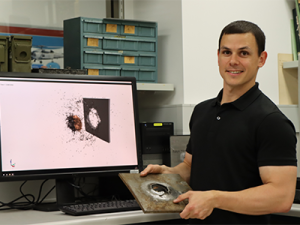Where are they now?
Celebrating Successes: Dr. Emily Kibble, Dr. Joseph Polden and Dr. Brodie McDonald
DMTC has provided pathways for early-career researchers in the defence and related sectors through both internship and scholarship opportunities. Through its Education portfolio, DMTC is committed to boosting the pipeline of young, innovative Australians who can progress from academia to applied research and on to employment in defence industry or related fields of industry and ongoing research. In this respect DMTC, the research providers and the industry employer are all playing an important role in realising the Australian Government’s long-term vision for Australia’s defence industrial base.
In a series of interviews with several exemplary former participants in our Education program, we explore how support from DMTC has impacted their career trajectory. The following are highlights from our conversations with Dr Emily Kibble (Phd completed in Western Australia), Dr Joseph Polden (PhD completed in New South Wales), and Dr Brodie McDonald (PhD completed in Victoria).
Dr. Emily Kibble (WA) – Molecular Biology and Health Security
Emily’s research in molecular biology focused on the bacteria that causes invasive meningococcal disease (IMD). IMD causes infection and swelling of the brain (meningitis), and infection of the blood (sepsis), and can be fatal even with proper treatment. She investigated ‘a set of enzymes that are believed to be involved in the ability of this bacteria to cause disease… called Macrophage Infectivity Potentiators, or Mips…’.
‘Each year of my PhD I presented a poster presentation at the DMTC Annual Conference, and an oral presentation at the DMTC Student Conference. This experience gave me skill and confidence for when I went on to present to expert academic audiences at research conferences.’
‘Involvement in a DMTC Project throughout my PhD allowed me to see the greater context of my research… to aid Australian Defence personnel, as well as the general population…’.
In addition to her research, Emily developed a novel screening mechanism to reduce the time required to test anti-virulence inhibitors against pathogens, increasing the efficiency of the testing process. Emily was the deserving recipient of the Australian Industry and Defence Network (AIDN) Young Achiever of the Year Award in 2018, the Edith Cowan University Award for Australian Society for Microbiology Student Oral Presentation at the Combined Biological Sciences Meeting (CBSM) Conference in 2019 and the Early Career Award at the 2020 DMTC Annual Conference.
DMTC is grateful that Emily chose to return and join the Company in a full-time project management role. ‘Since submitting my PhD in March 2021, I now use my specialised area of knowledge to help manage projects within the new Health Security Systems Australia (HSSA) division of DMTC, which progress sovereign industrial and research capabilities.’
You can read more of Emily’s research here.
Dr. Joseph Polden (NSW) – Industrial Robots and Manufacturing
Joseph’s research focused on the development of software to assist in the programming process for industrial robots. According to Joseph, such robots ‘can vastly improve productivity in manufacturing processes.’ However, ‘programming them to complete their given task (such as welding or painting) is a challenging and expensive exercise in and of itself. These expenses are further increased when considering that, in many modern manufacturing scenarios, frequent updates to the manufacturing process are often made which then requires the robotic systems to be reprogrammed.’
Through his PhD project, Joseph was involved in developing ‘a piece of software to drastically reduce the amount of effort (and costs) associated with programming the robotic welding system of an industry partner of the DMTC.’ This software has been successfully commercialised by startup company Verbotics.
Following completion of his PhD, Joseph worked overseas but has since returned to Australia where he is a postdoctoral research fellow at the University of Wollongong, a role that has included active involvement in multiple projects within DMTC’s maritime program. Joseph credits DMTC with adding a practical industrial dimension to his PhD experience.
‘Through the DMTC’s network of industry partners, we can interact directly with manufacturers and discover their issues firsthand. As an engineer and researcher, this provides an exciting and stimulating portal to be exposed to problems encountered in real world manufacturing scenarios and work to develop solutions for them. What more could a budding engineer want?’
Dr. Brodie McDonald (VIC) – Modelling of Vehicular Armour under Blast Loading
Since completing his PhD, Brodie has joined the Defence Science and Technology Group where he is a Defence Scientist working within the vehicle survivability research group. His postdoctoral research, conducted with DMTC’s support, involved ‘developing computer simulations to virtually test armour against blast weapons like landmines or IED’s.’ Brodie’s particular focus was ‘on being able to predict the point where the armour reaches its deformation limit and begins to tear open, a critical point in overmatch testing of vehicle armour. These simulations allow us to design and evaluate armour without having to conduct as many expensive, time-consuming live fire experiments.’
Brodie reflects positively on DMTC’s backing throughout his postdoctoral research: ‘DMTC was extremely helpful and generous in supporting my travel for over 6 weeks of blast testing at the University of Cape Town in South Africa. On top of the scientific value of this testing it gave me an opportunity to present and discuss my work with a world class research group and build lasting connections with the University Professors and graduate students.’
‘The research skills developed throughout my PhD are critical to how I approach any new problem in this role. Involvement with DMTC and exposure to the full range of projects supported by DMTC at the annual conferences has given me contacts in the land, maritime and air domains which have opened up unique opportunities for collaboration that wouldn’t have been possible otherwise.’
